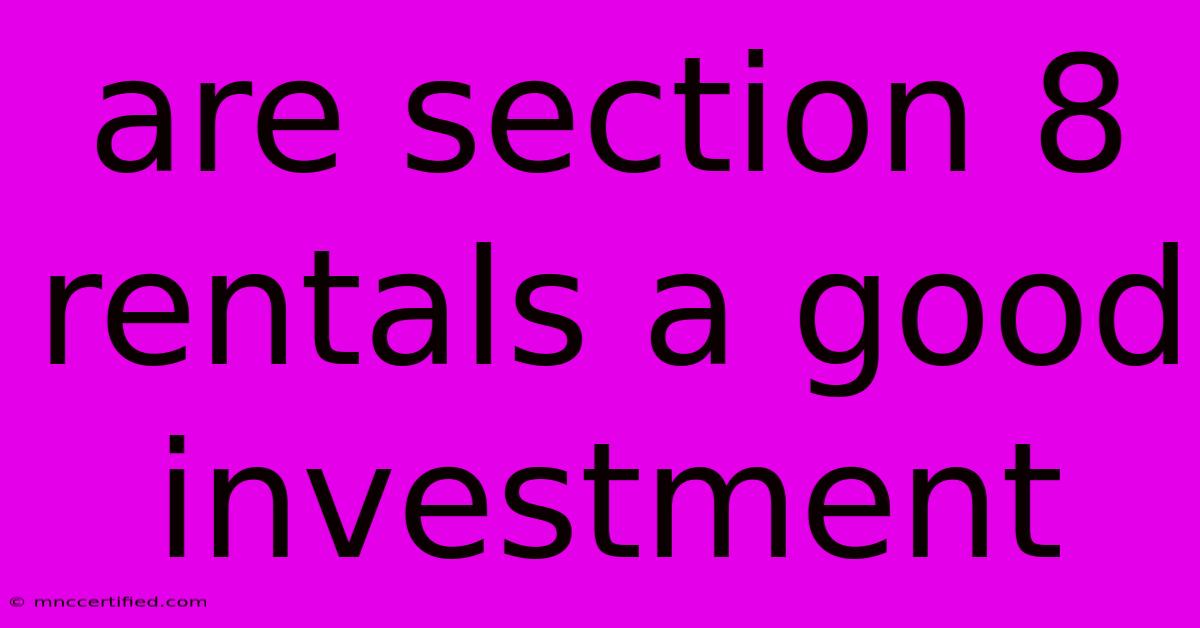Are Section 8 Rentals A Good Investment

Table of Contents
Are Section 8 Rentals a Good Investment? The Pros and Cons to Consider
Investing in real estate can be a lucrative venture, but it's essential to understand the risks and rewards associated with different types of properties. Section 8 rentals, which are subsidized by the government to provide affordable housing options, often attract investors seeking steady income and a positive social impact. However, are they truly a good investment? Let's delve into the pros and cons to help you make an informed decision.
The Potential Advantages of Section 8 Rentals
1. Guaranteed Income: Section 8 tenants receive rental assistance, making it highly likely they will be able to pay their rent on time. This eliminates the risk of vacancy and income instability that can plague traditional rental properties.
2. Stable Tenancy: As long as the tenant meets the program's requirements, they are likely to remain in the property for an extended period. This stability can provide peace of mind for landlords and reduce the need for frequent turnover, which can be costly.
3. Tax Incentives: Landlords of Section 8 properties can benefit from tax breaks and deductions, making the investment even more attractive.
4. Social Impact: Investing in Section 8 rentals can have a positive impact on the community by providing affordable housing to low-income families. This can be a rewarding factor for investors seeking a socially responsible investment.
5. Lower Maintenance Costs: Some landlords report that Section 8 tenants tend to take better care of properties, as they are invested in maintaining a comfortable living space. This can lead to lower maintenance costs in the long run.
The Potential Disadvantages of Section 8 Rentals
1. Lower Rental Rates: Section 8 rental rates are typically lower than market rates due to government subsidies. This can limit potential profits for landlords.
2. Strict Regulations and Requirements: The Section 8 program involves strict guidelines and regulations that landlords must adhere to, including tenant screening, property inspections, and reporting requirements. These regulations can add complexity and administrative burden to property management.
3. Potential for Tenant Issues: While Section 8 tenants are typically screened, some landlords report experiencing challenges with tenant behavior or property damage. It's important to thoroughly vet tenants and have clear lease agreements.
4. Government Funding Uncertainty: The future of the Section 8 program can be uncertain, as government funding can fluctuate. Changes in funding levels or program policies can impact the long-term viability of Section 8 rentals.
5. Limited Market Appeal: Traditional tenants might be hesitant to rent a Section 8 property, as they may perceive it as having a higher risk of tenant issues or lower quality. This can limit the potential pool of renters if a Section 8 tenant leaves.
Weighing the Pros and Cons: A Balanced Perspective
Ultimately, whether Section 8 rentals are a good investment for you depends on your individual goals and risk tolerance.
If you prioritize stable income, social impact, and potential tax benefits, Section 8 rentals might be worth considering. However, be prepared for lower rental rates, increased administrative burden, and potential challenges in finding suitable tenants.
It's crucial to conduct thorough research, understand the local regulations and program requirements, and carefully select tenants to maximize your investment potential.
Consulting with experienced property managers or real estate professionals can provide valuable insights and guidance for making the right decision.
Boosting Your Search Rankings: SEO Best Practices
This article aims to optimize for searches related to "Section 8 rentals" and "Section 8 investment."
Here's how it integrates SEO best practices:
- Keyword Usage: Key terms like "Section 8," "rentals," "investment," "pros," "cons," "advantages," "disadvantages" are strategically incorporated throughout the text.
- Headers: Clear headers (H2, H3) enhance readability and help search engines understand the content's structure.
- Readability: The article aims for clear and concise language, making it easy for readers to understand.
- Content Quality: The content offers balanced and comprehensive information, addressing both positive and negative aspects of Section 8 rentals.
- Call to Action: Encourages readers to conduct further research and consult with professionals, fostering engagement and trust.
Remember, SEO is an ongoing process. Continuously monitor your website's performance, adjust content based on analytics, and build backlinks to improve your search ranking over time.

Thank you for visiting our website wich cover about Are Section 8 Rentals A Good Investment. We hope the information provided has been useful to you. Feel free to contact us if you have any questions or need further assistance. See you next time and dont miss to bookmark.
Featured Posts
-
Rugby Rankings All Blacks Narrow Springboks Gap
Nov 09, 2024
-
Bhad Bhabie Cancer Meds Led To Weight Loss
Nov 09, 2024
-
Nicole Scherzinger Broadway Star Backlash
Nov 09, 2024
-
Barnes Insurance Wilson North Carolina
Nov 09, 2024
-
Cks Prime Investments Llc Phone Number
Nov 09, 2024